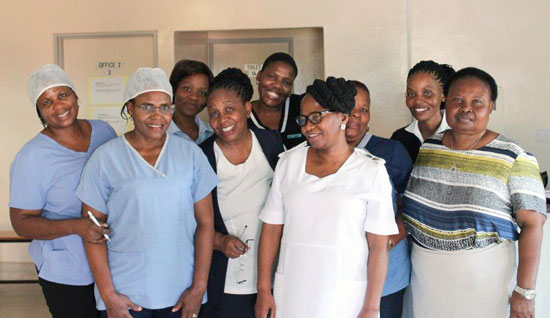
26 Mar HRH2030 Announces New Activity to Support HIV/AIDS Epidemic Control in Botswana
After a decades-long effort, The U.S. President’s Emergency Plan for AIDS Relief (PEPFAR) recently recognized Botswana as one of 13 high-burden countries that have the potential to achieve HIV/AIDS epidemic control by 2020. To support the country’s efforts and sustain its successes, the HRH2030 program, funded by the U.S. Agency for International Development (USAID) through PEPFAR, is pleased to partner with the government of Botswana to strengthen its health workforce and effectively align its community-based human resources with innovative service delivery models.
While Botswana has made great progress toward epidemic control in the past decade, it still has one of the highest HIV prevalence and infection rates in the world. Success hinges on the country’s ability to accommodate the burgeoning number of patients on antiretroviral treatment — not only getting them onto treatment but keeping them there.
Like other countries in the region, Botswana has recognized the importance and urgency of re-examining not only what but how it delivers care for HIV patients and for the population as a whole. Most people living with HIV in Botswana are already on treatment, which means that more than a quarter of the population engages with the health system — its hospitals, clinics, and staff — monthly.
“The majority of these patients aren’t feeling sick; they come for routine appointments and refills. Congested facilities add to the already difficult lives of health workers and patients, especially poorer ones and those who need life-long [antiretroviral treatment]. Simplifying and differentiating how the system delivers care is, therefore, critical to help patients and to reduce the burden on frontline staff and systems,” said HRH2030 Botswana Project Director Cecil Haverkamp.
Recognizing Botswana’s longstanding commitment to primary health care, HRH2030 will work with the Ministry of Health and Wellness, USAID, PEPFAR, and other stakeholders to examine existing service delivery models and adapt them to deliver differently. Community leaders and community-based health workers, in particular, will play a central role in government efforts to transform health care and prevention in Botswana.
“For the people of Botswana, it’s important that we improve the delivery of services to the community — whether people suffer from HIV/AIDS or other conditions. Community members expect to be involved not as passive recipients but as genuine partners of the formal health system. Our traditional community leaders are well respected and can play a powerful role in creating supportive environments for people to stay healthy and take their medications,” explained HRH2030 Botswana Senior Quality Improvement Advisor Kesaobaka Dikgole.
In Botswana, HRH2030 will partner with the government to:
- Improve the delivery of quality HIV services through new models of differentiated care
- Implement new government strategies and guidelines to better organize health workers for innovative service delivery models (especially at community level)
- Provide a costing analysis and other evidence to support policy decisions that strengthen service delivery innovation and sustainability
- Apply targeted quality improvement methods to support community-based health workers to provide patient-centered, high-quality HIV care
HRH2030 will build upon the USAID ASSIST project’s work to organize and deploy human resources for improved models of care and integrated service delivery.
HRH2030’s work in Botswana will involve, contribute to, and weave into related PEPFAR efforts, such as the Advancing Partners and Communities project, which aims to scale up community-based service delivery across eight PEPFAR priority districts.
Photo: Nurses and facility managers at the Kgatelopele Clinic in Gaborone, Botswana join members of the HRH2030 team for a photo. HRH2030 is pleased to partner with the government of Botswana to strengthen its health workforce and effectively align its community-based human resources with innovative service delivery models.





